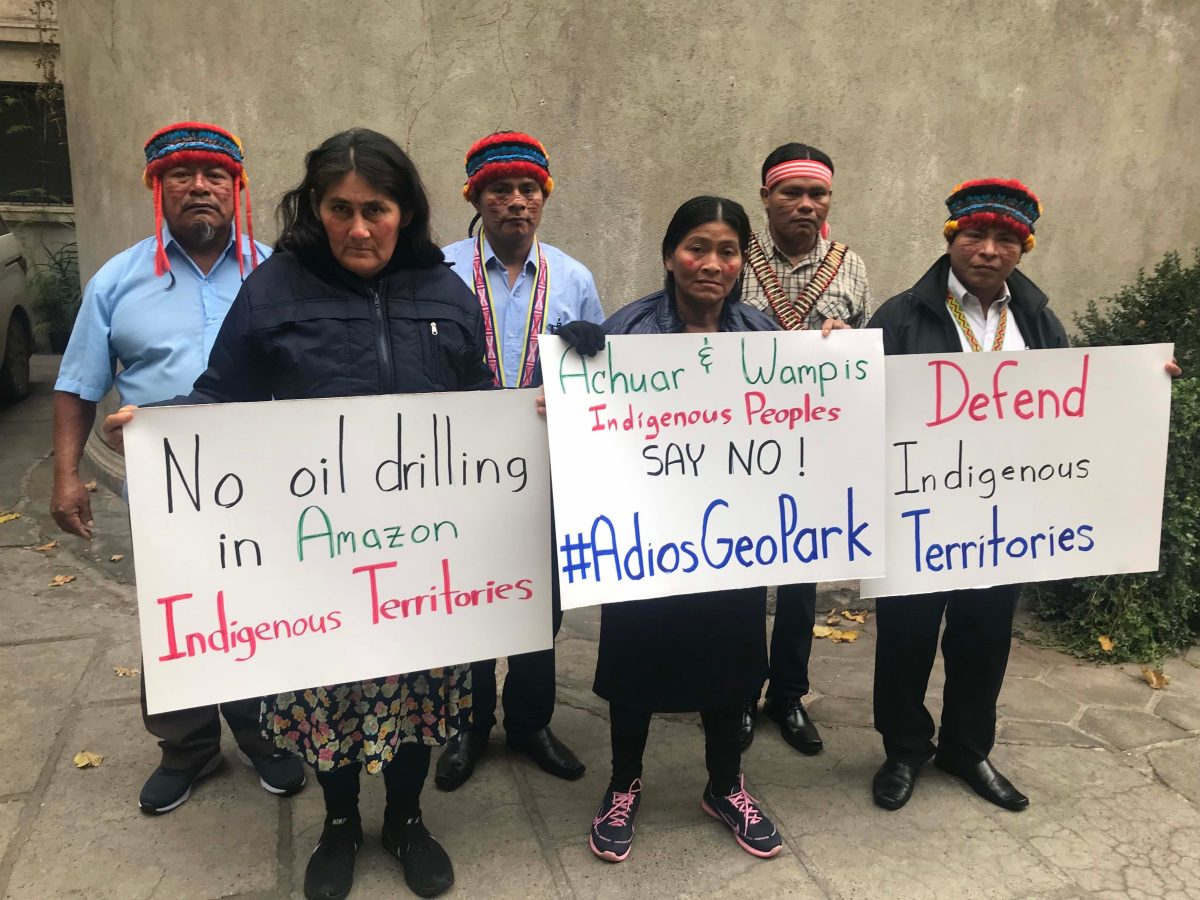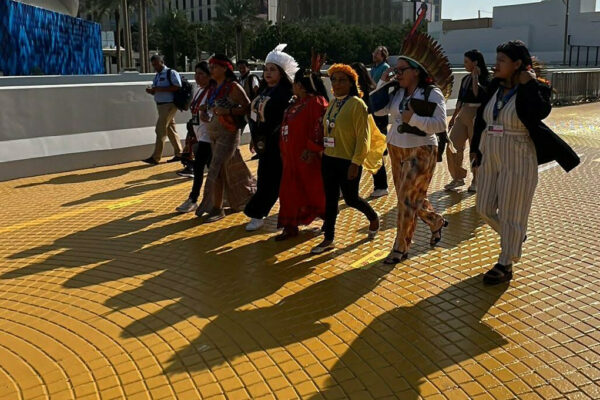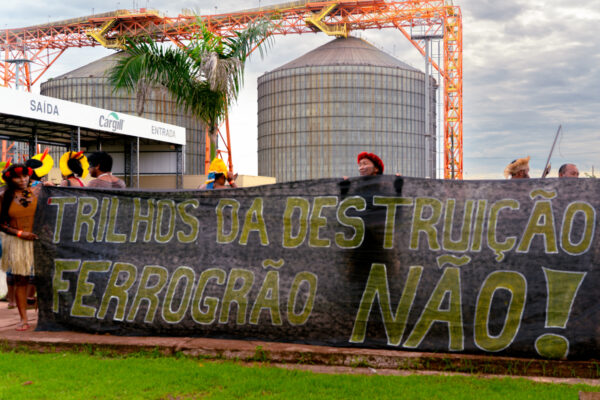As the CEO and board of directors of Chile-based oil company GeoPark met with eight indigenous leaders from the Peruvian Amazon, a security officer provided safety instructions in the event of an earthquake. Little did the corporate officers know they were about to be struck by a massive quake in the form of Achuar and Wampis who are determined to protect their ancestral territories and keep all industrial resource extraction out of their lands.
The occasion was GeoPark’s annual general meeting (AGM), held at their Santiago, Chile headquarters on June 27th. The group of indigenous leaders had traveled many days from their territories to Santiago – via boat, bus, and airplane – to raise the profile of their resistance to resource extraction within millions of acres of virgin Amazon rainforest. Over recent days, they had detailed their situation to Mapuche indigenous leaders, civil society activists, and United Nations human rights officials. They made public presentations in universities and gave media interviews. Immediately prior to the meeting, they convened a solidarity protest outside GeoPark’s headquarters attended by new-found Chilean allies.
As opposed to previous oil company AGMs I have attended, no shareholders beyond the corporate officers (who hold a fair amount of stock in the company) were in attendance and the official business lasted roughly five minutes. The rest of the meeting, which ultimately ran an hour and a half, was dominated by the interaction between indigenous community leaders, the CEO Jim Park, and the company’s socio-environmental managers.
First, each of the eight indigenous representatives – five from the Achuar People of the Pastaza and three from the Wampis Nation – spoke in turn. They didn’t pull any punches. One by one they reiterated their peoples’ demand that GeoPark withdraw from Block 64, the controversial oil concession that mostly overlaps Achuar territory but also includes Wampis communities.
Nelton Yankur, elected as the President of FENAP in their March 2019 assembly, summarized their position this way:
“As the Achuar People, along with the Wampis Nation, we completely reject the entry of GeoPark into our territory. You all are aware of human rights and environmental law, yet you still insist on polluting our lands. Understand that no matter how much you insist on entering our territory, we are never going to allow oil companies to come in. Why? Because we have prior experiences – in the Corrientes River, in Andoas – where the rivers are polluted, the animals are poisoned, and they are not fit for human consumption.”
These sentiments were repeated from different perspectives by the other indigenous representatives. In his presentation, Achuar professor Sumpinianch Mitiap handed Jim Park a packet of statements, articles and photos that have been issued or publicized over the last several years, in which the Achuar and Wampis rejection of the oil project is stated and re-stated. “Here I have some documents that we have been presenting to GeoPark so that you understand us, but so far we have received no reply or positive result.”
Wampis leader Julio Hinojosa reinforced his demand that GeoPark abandon Block 64 with a broader critique about climate change and the hypocrisy of the company. Referring to GeoPark’s current social and environmental manager for their Peru project, who previously worked in the communities for Conservation International, he commented:
“Here we have engineer Martín Alcalde, who worked with us in the Cordillera del Condor region. He offered environmental workshops, teaching that we shouldn’t throw out even a shred of paper. We shouldn’t throw anything in the rivers because they become polluted. And now we’re learning from the mass media, via television and newspaper, about the environmental crisis we’re living. For this crisis, we indigenous peoples are not to blame. The guilty parties for this climate change are extractive corporations.”
In addition to the environmental issues, many of the indigenous leaders mentioned the social conflicts that are generated by incoming corporations. Chiwiant Mashiant, president of the Achuar Association of Morona, outlined the concerns:
“I’m from the community of Putuntsa, neighbor to the oil wells known as 2X and 3X in Block 64. Oil companies have brought us divisions and conflict. We see the problems of division in our neighboring communities of Brasilia and Katirna. We don’t want these problems, it would be best for GeoPark to pull out.”
One of the two Achuar women delegates, Puwaanch Kintiu, had traveled to Canada in 2012 to confront Talisman Energy, the previous oil company that attempted to explore and exploit Block 64. She repeated many of the words she spoke seven years ago for the GeoPark leadership:
“We know you understand respect: respect for the law, respect for human rights, respect for women’s rights. We also want to be respected. I’m not here for pleasure, I’m here to return home with a positive outcome for the well-being of my children. I want you to tell us from here forward that you are not going to continue insisting on entering our territory.”
Having heard all the comments, CEO Park led the company’s response. He claimed that the company admires the indigenous leaders who traveled to participate in the meeting and that the company shares their principles, although it has come to a different conclusion on how to reach them. “As a company, we were invited to participate in the project given the kind of company we are and that this is a sensitive area. Now I see this is a confusing situation because some people are saying we weren’t invited, that we’ll do harm. Others see us as a possible opportunity and others are pushing us to comply with our commitments. We came to do a project and show we can do it correctly with the capacities we have, and I think we are different.”
“I understand that you want a specific response from us today but that’s a lot for us in one meeting. We’d be willing to come to where you live to talk, to share and see if we can reach a solution. What we’re not going to do is an operation that impacts the fears you have – the divisions, the pollution, harming the forests, harming the future, the people.”
The further comments from Norma Sánchez, GeoPark’s manager for environment and social issues, and Martín Alcalde centered on the importance of an ongoing dialogue. Each attempted to make a case for why they wanted to keep talking and to go into detail about each of the points that the Achuar and Wampis had made. Extraordinarily. Alcalde said, “The only thing we as GeoPark want is to listen and learn.” Sánchez followed up stating, “And we have no intention of trying to change you, what you have said you are feeling and thinking. We totally respect this.”
It was as if this were the first time the GeoPark executives were hearing these concerns. As if the indigenous federations hadn’t communicated the same concerns repeatedly over several years. As if there weren’t a rich public record – available via a quick Google search – of all the resistance to oil activities in Block 64 resulting in the departures of ARCO, Oxy, and Talisman. As if influencing the local community perception in favor of the oil company to manufacture a modicum of “social license” weren’t the key role of what those two did as environmental and social managers. As if the main reason for GeoPark to exist weren’t to maximize shareholder value by extracting oil.
The indigenous response was withering. Nelton led off by saying, “We don’t want more dialogue, whether in Lima or anywhere else. Mr. Martín Alcalde already knows about the reality of the Achuar People. This is our first time here in your office but he travels regularly to Block 64 and the region near Situche Central and knows our reality very well. If you want, invest somewhere else – but not in Achuar territory.”
“You already know about the issues that we’ve brought here,” added Julio. “Discuss them, examine them, analyze them, come to your conclusion, and then you can communicate with us in writing through our legal advisors in Lima.”
Try as they might to persuade the indigenous leaders, the GeoPark executives were unable to extract a commitment to engage in future discussions. The meeting ended awkwardly, with GeoPark agreeing to send some sort of follow-up statement at some unspecified point in the future to the Achuar and Wampis legal advisors.
When it was over, everyone offered their cordial goodbyes. As CEO Park shook the hand of Puwaanch, he said “I’ll have to learn Achuar to be able to speak with you.” Don’t waste your time, Mr. Park. Your company isn’t welcome in Achuar territory.














